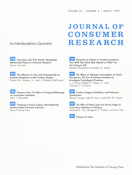-
Views
-
Cite
Cite
Michael K. Hui, Mrugank V. Thakor, Ravi Gill, The Effect of Delay Type and Service Stage on Consumers' Reactions to Waiting, Journal of Consumer Research, Volume 24, Issue 4, March 1998, Pages 469–479, https://doi.org/10.1086/209522
Close - Share Icon Share
Abstract
This study considers the interaction effect of service stage (conceptualized as the distance to the goal state of the service encounter) and delay type (procedural, correctional, and unknown) on consumers' reactions to waiting. Field theory suggests that the further away a delay occurs from the goal state of the service encounter, the more negative its impact will be on consumers. The anticipatory model, however, suggests that the direction of the impact should be the other way around. Results obtained from an experimental study confirm that the nature of the delay, in terms of whether it constitutes a threat to the successful completion of a task or not, moderates the impact of service stage (i.e., how close to the goal state the delay occurs) on consumers' reactions to the wait.



